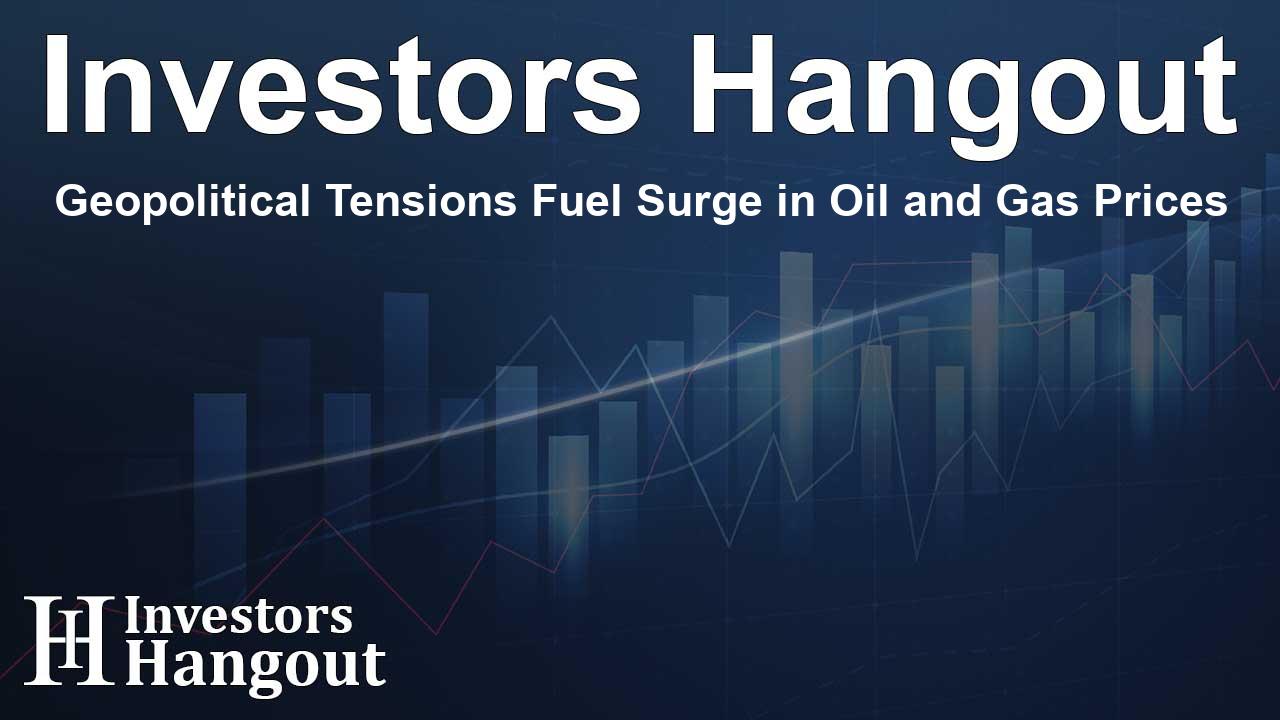Geopolitical Tensions Fuel Surge in Oil and Gas Prices

Geopolitical Tensions Fuel Surge in Oil and Gas Prices
The financial markets are experiencing a notable shift as geopolitical tensions rise, significantly impacting crude oil and gas prices. Investors are keeping a close watch on these developments as they unfold, closely monitoring how they affect broader economic indicators. Recent events, particularly related to Russia and Ukraine, have created uncertainty and volatility in energy markets.
Market Reactions to Energy Price Changes
In light of growing tensions, natural gas futures in the U.S. have seen a dramatic increase. Energy prices are showing strong responses to the news of escalated conflict and sanctions against major Russian financial institutions. Amid geopolitical uncertainties, the cost of natural gas surged past previous summer peaks, surprising many analysts. Such price escalations are partially due to the constrained supply of Russian gas, prompting concerns about future availability.
Impact on European Energy Markets
Europe finds itself in a precarious position, with its energy landscape increasingly affected by reduced supplies from Russia. The latest sanctions have tightened an already limited gas supply, consequently driving voices in the market to predict a rise in prices. With European gas futures showing significant rallies, it’s evident that analysts and investors expect a continued upward trend as tensions escalate.
The Response from U.S. Crude Oil Markets
Similarly, U.S. crude oil has jumped above the $70 per barrel mark, signaling a new phase in energy pricing. Although prices are facing some resistance due to previous supply levels, the overall market sentiment is shifting in favor of oil bulls. The potential for increasing market share in Europe is a key motivation for U.S. energy companies looking to capitalize on these changes.
Broader Economic Implications
The impact of rising energy prices extends beyond mere numbers on a screen; it deeply influences economic forecasts and consumer behavior. With inflation concerns once again in focus, analysts are attempting to gauge how sustained high energy prices might affect consumer spending and business revenues. Economic recovery is contingent on maintaining a delicate balance between growth and inflation, particularly as the Fed assesses future actions amid changing financial landscapes.
Fueling Inflationary Pressures
Rising energy prices inevitably feed into inflation, putting pressure on both consumers and central banks. While strong economic growth is generally favorable, it poses a significant challenge when combating inflation. The ongoing rise in commodity prices may lead to increased scrutiny over monetary policies, particularly regarding potential interest rate adjustments by the Federal Reserve.
Strategic Moves by Investors
As the geopolitical situation remains fluid, strategic positioning becomes crucial for investors. Many are re-evaluating their portfolios as they navigate the complex landscape shaped by external tensions and domestic economic conditions. Monitoring the interactions between energy prices, inflation rates, and economic recovery will be vital for making informed investment decisions moving forward.
Frequently Asked Questions
What factors are driving up oil and gas prices?
Escalating geopolitical tensions, particularly involving Russia and Ukraine, have contributed significantly to rising oil and gas prices through limited supplies and increased demand for safe-haven assets.
How have U.S. and European energy markets responded to the crisis?
U.S. energy markets have seen crude prices surpass $70 per barrel, while European gas futures have shown significant rallies due to reduced Russian supplies and increased sanctions.
What are the implications of high energy prices on inflation?
High energy prices contribute to inflation by increasing the cost of goods and services. This poses challenges for central banks as they balance economic growth with inflation control.
How could the Federal Reserve respond to rising energy prices?
The Federal Reserve may need to reassess its monetary policy approach to address inflationary pressures resulting from increased energy costs, potentially impacting interest rate decisions.
What are investors doing in response to the rising tensions?
Investors are strategically positioning portfolios to account for the changing landscape influenced by energy prices and geopolitical tensions, focusing on sectors that may benefit from this shift.
About Investors Hangout
Investors Hangout is a leading online stock forum for financial discussion and learning, offering a wide range of free tools and resources. It draws in traders of all levels, who exchange market knowledge, investigate trading tactics, and keep an eye on industry developments in real time. Featuring financial articles, stock message boards, quotes, charts, company profiles, and live news updates. Through cooperative learning and a wealth of informational resources, it helps users from novices creating their first portfolios to experts honing their techniques. Join Investors Hangout today: https://investorshangout.com/
Disclaimer: The content of this article is solely for general informational purposes only; it does not represent legal, financial, or investment advice. Investors Hangout does not offer financial advice; the author is not a licensed financial advisor. Consult a qualified advisor before making any financial or investment decisions based on this article. The author's interpretation of publicly available data shapes the opinions presented here; as a result, they should not be taken as advice to purchase, sell, or hold any securities mentioned or any other investments. The author does not guarantee the accuracy, completeness, or timeliness of any material, providing it "as is." Information and market conditions may change; past performance is not indicative of future outcomes. If any of the material offered here is inaccurate, please contact us for corrections.